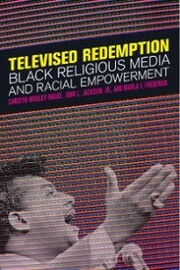Detailansicht
Televised Redemption
eBook - Black Religious Media and Racial Empowerment
ISBN/EAN: 9781479840458
Umbreit-Nr.: 802868
Sprache:
Englisch
Umfang: 0 S.
Format in cm:
Einband:
Keine Angabe
Erschienen am 22.11.2016
Auflage: 1/2016
E-Book
Format: EPUB
DRM: Adobe DRM
- Zusatztext
- <p><b>How Black Christians, Muslims, and Jews have used media to prove their equality, not only in the eyes of God but in society.</b><br> The institutional structures of white supremacyslavery, Jim Crow laws, convict leasing, and mass incarcerationrequire a commonsense belief that black people lack the moral and intellectual capacities of white people. It is through this lens of belief that racial exclusions have been justified and reproduced in the United States. Televised Redemption argues that African American religious media has long played a key role in humanizing the race by unabashedly claiming that blacks are endowed by God with the same gifts of goodness and reason as whitesif not more, thereby legitimizing black Americans rights to citizenship.<br><br>If racism is a form of perception, then religious media has not only altered how others perceive blacks, but has also altered how blacks perceive themselves. Televised Redemption argues that black religious media has provided black Americans with new conceptual and practical tools for how to be in the world, and changed how black people are made intelligible and recognizable as moral citizens. In order to make these claims to black racial equality, this media has encouraged dispositional changes in adherents that were at times empowering and at other times repressive. From Christian televangelism to Muslim periodicals to Hebrew Israelite radio, Televised Redemption explores the complicated but critical redemptive history of African American religious media.</p>
- Kurztext
- How Black Christians, Muslims, and Jews have used media to prove their equality, not only in the eyes of God but in society. The institutional structures of white supremacy-slavery, Jim Crow laws, convict leasing, and mass incarceration-require a commonsense belief that black people lack the moral and intellectual capacities of white people. It is through this lens of belief that racial exclusions have been justified and reproduced in the United States. Televised Redemption argues that African American religious media has long played a key role in humanizing the race by unabashedly claiming that blacks are endowed by God with the same gifts of goodness and reason as whites-if not more, thereby legitimizing black Americans' rights to citizenship. If racism is a form of perception, then religious media has not only altered how others perceive blacks, but has also altered how blacks perceive themselves. Televised Redemption argues that black religious media has provided black Americans with new conceptual and practical tools for how to be in the world, and changed how black people are made intelligible and recognizable as moral citizens. In order to make these claims to black racial equality, this media has encouraged dispositional changes in adherents that were at times empowering and at other times repressive. From Christian televangelism to Muslim periodicals to Hebrew Israelite radio, Televised Redemption explores the complicated but critical redemptive history of African American religious media.
- Autorenportrait
- <b>Carolyn Moxley Rouse (Author)</b><br><b>Carolyn Moxley Rouse</b> is Professor of Anthropology at Princeton University and the author of Uncertain Suffering: Racial Health Care Disparities and Sickle Cell Disease.<br><br><b>John L. Jackson, Jr. (Author)</b><br><b>John L. Jackson, Jr.</b> is Richard Perry University Professor and Dean of the School of Social Policy& Practice at the University of Pennsylvania and co-author of Impolite Conversations: On Race, Politics, Sex, Money and Religion.<br><br><b>Marla F. Frederick (Author)</b><br><b>Marla Frederick</b>is Professor of Religion and Culture at Emory University. She is the author of<i> Between Sundays: Black Women and Everyday Struggles of Faith</i> (University of California Press, 2003)<i></i>and co-author of<i>Televised Redemption: Black Religious MEdia and Racial Empowerment</i> (NYU Press 2016).<br><br>
